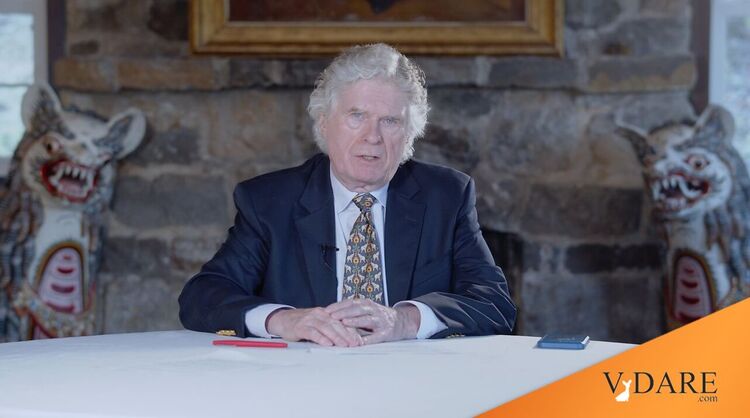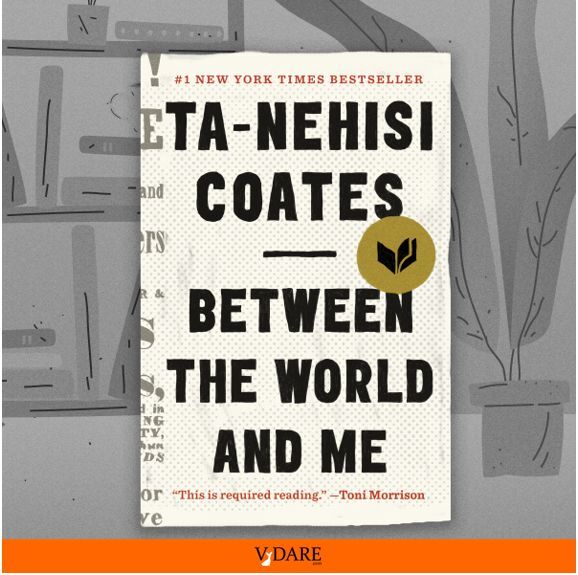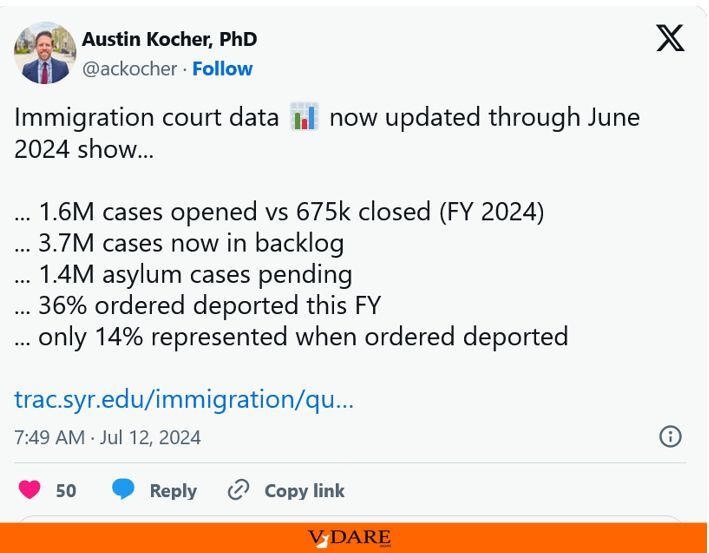David Frum had an excellent piece about Jeb Bush in The Atlantic, likely extending an idea I put forward in a Taki’s Magazine column last fall about Obama’s mother as a variant of an old archetype of Yankee imperialistic ambition exercised through migration and intermarriage.
Is Jeb Bush a Republican Obama?Oddly, Columba Bush is not from Mexico’s elite. She was an illegal alien in California for a while as a child while her father did manual labor. With her criminal record of trying to smuggle goods past Customs as First Lady of Florida and general lack of education, Columba Bush would make an embarrassing First Lady for the country, in contrast to her classy, well-read sister-in-law Laura Bush, who was a model of dignity and discretion.The GOP may have found its own candidate for the age of fluidity represented—and accelerated—by the presidency of Barack Obama.
DAVID FRUM FEB 4 2015, 4:02 PM ET
… Yet when a man speaks for the record as often as has Jeb Bush, he deposits there enough material to learn something interesting about the man he is, rather than the boy he was.
Jeb Bush will tell you that, thanks to his marriage to his Mexican-born wife, he is bicultural. Here he is speaking at New York’s 92nd Street Y in November 2013:
“I’m bicultural—maybe that’s more important than bilingual. For those who have those kinds of marriages, appreciating the culture of your spouse is the most powerful part of the relationship. Being able to share that culture and live in it has been one of the great joys of my life. We chose Miami to live because it is a bicultural city. It’s as American as any, but it has a flair to it that is related to this bicultural feeling. I wanted my children to grow up in a bicultural way.”
While modestly disavowing bilingualism, Jeb Bush does speak Spanish readily. (His wife, reportedly, has not become equally comfortable in English.)
His three children speak both English and Spanish.Uh-oh.As Jeb Bush himself notes, there is a Bush family tradition of moving away from the culture into which one is born, to plunge into another. George H.W. Bush, born to a family of Northeastern grandees, reinvented himself as Sunbelt conservative. George W. Bush, born in New Haven, Connecticut, was the only member of the next generation of Bush brothers not born in Texas, and yet became the most Texan of them all. Jeb Bush moved away first from Texas, and then from his family’s patrician identity as White Anglo-Saxon Protestants.
“I’ve actually converted to Catholicism … I’m whatever a W-A-S-C would be. I’m a proud Catholic and a converted one, principally because this was the faith of my wife, and I wanted our children to grow up in a non-mixed marriage. So … no longer a WASP.”
His family story and his relocation to Miami, a gateway to Latin America, have focused Jeb Bush’s attention on the topic of immigration. Listen to hours of his comments on public policy, and it quickly becomes overwhelmingly apparent that this is the public policy issue he cares about by far the most.
Jeb Bush will often list three-point and four-point plans to get America moving again. But when he does so, it is the immigration point that seems almost always to energize him most. He even published a book on the subject in 2013, coauthored with Clint Bolick, a well-known libertarian lawyer.Back in November I wrote:In “Immigration Wars,” Bush and Bolick recommend four major changes to US immigration law:
1) a gradual tightening of eligibility for family unification immigration;
2) tougher enforcement of immigration law in future, especially for visa overstayers;
3) a pathway to legality for the currently illegal;
and
4) a big surge in migration by skilled workers.
In interviews, however, Bush tends to touch lightly on the first two recommendations. It’s the latter two recommendations that most engage him. …
The way I look at this—and I’m going to say this, and it will be on tape, and so be it—is someone who comes to our country because they couldn’t come legally, because a dad who loved their children was worried that their children didn’t have food on the table, and wanted to ensure that their family remained intact … and they crossed the border because they had no other means to work to be able to provide for their family: Yes, they broke the law, but it’s not a felony. It’s an act of love, it’s an act of commitment to your family. I honestly think that is a different kind of crime. There should be a price paid, but it shouldn’t rile people up that there are people coming to our family to provide for their families.
Bush added that he thought such migrants could also “make a great contribution to our country if we organized ourselves in a better way.” That national-interest concern seemed very much a secondary thought—and the whole discussion of enforcement in general seemed subordinated to the larger message of urgency in favor of more and wider immigration than the country receives now. It’s a point he’s made on other occasions, albeit in somewhat-less quotable language.
Jeb Bush’s enthusiasm for immigration, even when the immigrants are unskilled, even if they break the law, goes so deep that he even sometimes ventures to suggest that the personal characteristics of immigrants are to be preferred over those of the native-born. Here for example is an informal Jeb Bush speaking to a friendly interviewer, National Review’s Jay Nordlinger, early in 2014. “If we’re going to grow at 4% a year, we have to have young, aspiring people be able to create dynamic activity. And we can’t do that with our existing demographics.”
… This is not only a positive judgment on the immigrants themselves. It is also a negative judgment on native-born Americans.
This belief is premised both on a positive judgment about immigrants—and on an implicit assessment of American society as it exists today. Jeb Bush delivered an elaborated form of that negative assessment in a 2013 speech to the Faith and Freedom conference in Washington DC:
“Immigrants create far more businesses than native-born Americans over the last 20 years. Immigrants are more fertile, and they have more intact families. They bring a younger population. The one way that we can rebuild the demographic pyramid is to fix a broken immigration system to allow for people to come, to learn English, to play by our rules, to embrace our values, and to pursue their dreams in our country with a vengeance—to create more opportunities for all of us. This is a conservative idea. If we do this, we will rebuild our country in a way that will allow us to grow. If we don’t do it, we will be in decline—because the productivity of this country is dependent on young people that are able to work hard.”
It may seem a strange comparison, but Jeb Bush has a lot in common with Barack Obama.
On the issues, Jeb Bush and Barack Obama obviously intensely disagree. But politicians are more than walking issue clusters. …
Both Jeb Bush and Barack Obama are men who have openly and publicly struggled with their ambivalence about their family inheritance. Both responded by leaving the place of their youth to create new identities for themselves: Barack Obama, as an organizer in the poor African-American neighborhoods of Chicago; Jeb Bush in Mexico, Venezuela, and at last in Cuban-influenced Miami. Both are men who have talked a great deal about the feeling of being “between two worlds”: Obama, in his famous autobiography; Bush, in his speeches. Both chose wives who would more deeply connect them to their new chosen identity. Both derived from their new identity a sharp critique of their nation as it is. Both have built their campaign for president upon a deep commitment to fundamental transformation of their nation into what they believe it should be.
Twenty-first century America is a place consumed by issues of identity. More and more Americans identify themselves as “Americans-plus”—fully American, yet also partially something else; in America, but not exclusively defined by their American-ness. An older America expected that people would be all one thing or all another: black or white, male or female, American or foreign. Barack Obama excited a new generation of voters because he—like them—transcended such categories. In this latest scion of the Bush family, of all unlikely persons, the GOP may have found its own candidate for the age of fluidity represented—and accelerated—by the presidency of Barack Obama.
Stanley Ann Dunham Obama Soetoro’s predilection for marrying natives reflects a female version of an old WASP pattern that goes far back. … In fact, Yankee adventurers helped spread American power via strategic marriages to targeted native elites.In the 1890s, the Yankees betrayed their in-laws, overthrew the Hawaiian monarchy, and got Hawaii annexed.What the president’s mother did in marrying men of different races picked out by the American intelligence apparatus as future leaders in their homelands was novel only in that she was a WASP adventuress rather than a WASP adventurer.
… Ruling class Yankees of mixed ancestry have included the legendary head of CIA counterintelligence James Jesus Angleton, whose mother was Mexican. George P. Bush, who appears to be penciled in by the Bushes for the White House some time after his father Jeb is done with it, also has a Mexican mother.
In early 19th-century California, sailors from Boston and New York would jump ship in the sleepy Mexican province. The most enterprising Yankees would convert to Catholicism and marry the daughters of local landowners (who were typically triracial). Then in the 1840s, the Yankees helped subvert Mexican rule and sponsor California’s annexation by the U.S.
Similarly, Northeastern merchants arriving in Hawaii married into the native Hawaiian royal family and obtained title to huge expanses of some of the most beautiful land in the world.
… Now, it may seem like I’m just cherry-picking examples for this novel category of “not exactly white but very WASP foreign policy guys.” But consider the politician who may have been Obama’s role model: his rival for the 2008 Democratic nomination, former UN Ambassador Bill Richardson.Eventually, however, the rest of the world becomes aware of Yankee tricks, so this fun game of picking up valuable territories like California and Hawaii through backstabbing your hosts comes to an end. The elder Bush’s circle was intent on getting their grips on Mexico’s oil industry — Bob Mosbacher, GHW Bush’s Commerce secretary, said his dream was to be the first American CEO of Pemex, the Mexican oil monopoly — but over the last 100 years, Mexican elites have been pretty consistently anti-American and have thus resisted Yankee takeovers.The vaguely mestizo-looking Richardson is 3/4 Hispanic and 1/4th Boston upper crust. Richardson’s father broke Dwight Eisenhower’s leg in a 1913 college football game between Tufts and Army, then headed what’s now Citibank’s office in Mexico City, where he married his secretary.
Then, imperial backwash sets in and these Yankee adventurers with marital or blood ties abroad start using these ties to try to take over America: Obama using his racial relationship to Africa to become President, Jeb attempting to use his marriage to a Mexican former illegal alien to elect a new people to elect ever more Bushes.











